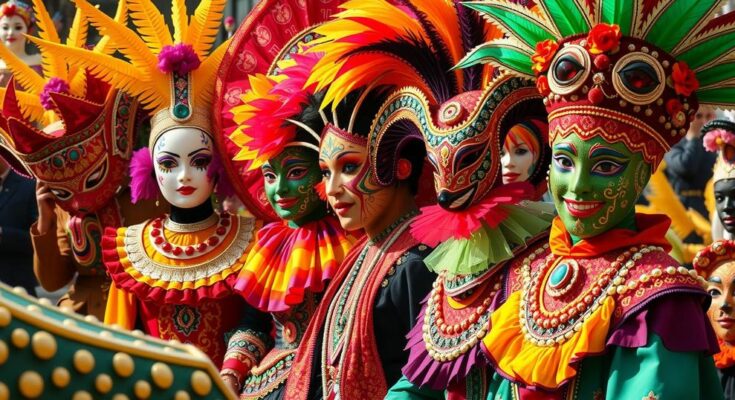Vulgar Fraction, a unique masquerade band in Trinidad’s Carnival, uses costumes to blend political commentary with cultural expression, highlighting issues like colonial legacies and global exploitation. Lead designer Robert Young emphasizes traces of resistance in the costumes inspired by historical themes. Amid the commercialization of modern Carnival, they strive to promote inclusivity and critical discourse through art.
Vulgar Fraction, a distinctive masquerade band in Trinidad’s Carnival, makes a powerful statement with their unique costumes crafted from flowy skirts, shredded banana tree pants, and makeshift masks. Their aesthetic contrasts starkly with the mass-produced, embellished outfits that dominate modern Carnival celebrations. This band’s approach roots deeply in the historical context of Carnival, reflecting a legacy of resistance against colonial oppression by enslaved Africans in Trinidad and Tobago
During the 18th and 19th centuries, enslaved peoples reclaimed their cultural identity by utilizing music, dance, and costumes to challenge their oppressors and create spaces for communal expression. This rich history of resilience is central to Robert Young, the lead designer of Vulgar Fraction, who believes that each costume serves as a medium of political commentary within the Carnival framework. Many attendees may view Carnival primarily as a festive partying occasion, losing sight of its deeper historical and political significance.
Young, whose familial ties to labor activism influence his artistic vision, strives to resist the commercialization that has permeated contemporary Carnival. He elaborates that the theme for Vulgar Fraction’s upcoming 2025 presentation, “Kongo Déy,” critiques the exploitation of the Congo, focusing on the minerals that fuel the electronics industry. With over two decades of experience in mas making, he emphasizes that Carnival is an ideal platform for engaging with pressing sociopolitical issues.
The conception of Vulgar Fraction embodies a community of artists who resist the temptation to conform to the luxury and exclusivity prevalent in many modern bands. Young recounts his journey into mas making, highlighting pivotal experiences that shaped his artistic expression, including his participation in the renowned band of Peter Minshall. He explains his motivation to create an inclusive band where artists can collaborate and critically explore pressing societal themes.
In discussing the integration of political themes into Carnival, Young notes the significant societal divisions that manifest in the parades, where wealth determines participation. He asserts the need for an alternative movement within Carnival culture, advocating for a return to collective creativity rather than consumer-focused entertainment. Through a mix of personal expressions and collaborative efforts, the costumes produced by Vulgar Fraction will allow participants to interpret and embody their representation on the Carnival day.
Young articulates the importance of the Congo theme in his work, linking it to the broader African Diaspora and exploring the legacies of resistance across cultures. He views Carnival as a space not merely for celebration but for political discourse, as history has shown it can be a powerful vehicle for critique. His commitment to remaining small-scale and intimate enhances the creative, chaotic essence that defines Vulgar Fraction’s presentations.
In the end, Young’s approach to Carnival underscores the significance of art as a form of political activism, reminding participants of its roots in resistance and communal identity. He claims that in this context, Carnival can transcend mere entertainment, emerging as a critical space for artistic expression and exploring the complexities of modern social issues.
The article underscores the pivotal role of Carnival as both a celebration and a vehicle for political discourse. Robert Young, through Vulgar Fraction, channels historical traditions of resistance into contemporary art forms, critiquing societal issues while fostering a sense of community among masqueraders. By emphasizing cultural legacy and social consciousness, the band serves as a reminder of Carnival’s deeper significance beyond entertainment, advocating for an alternative approach to modern festivities.
Original Source: nacla.org




